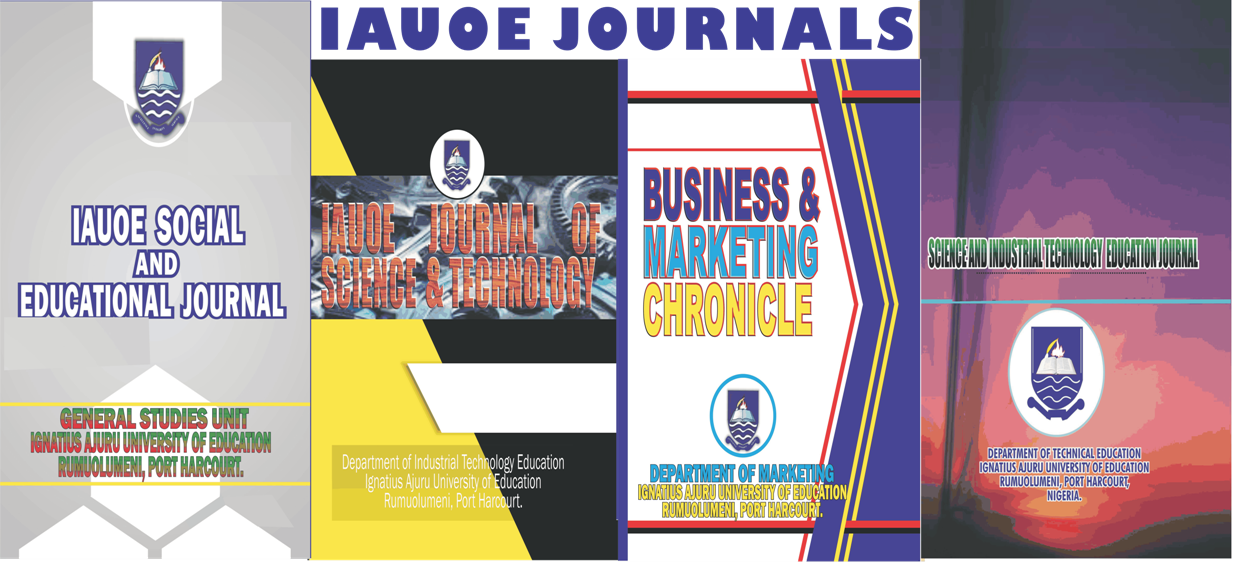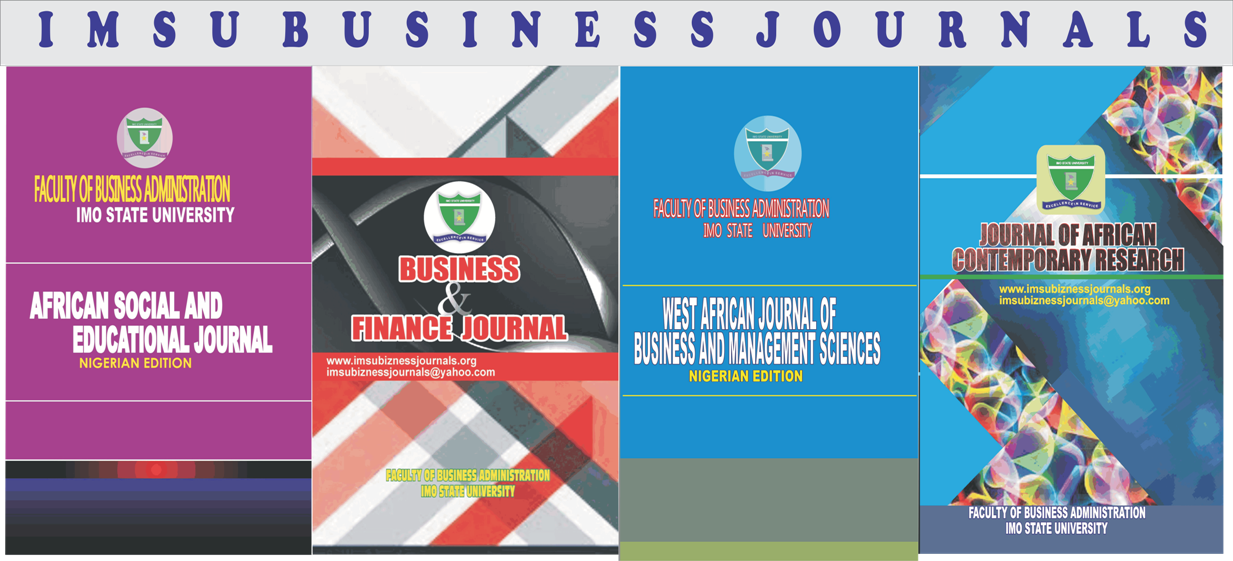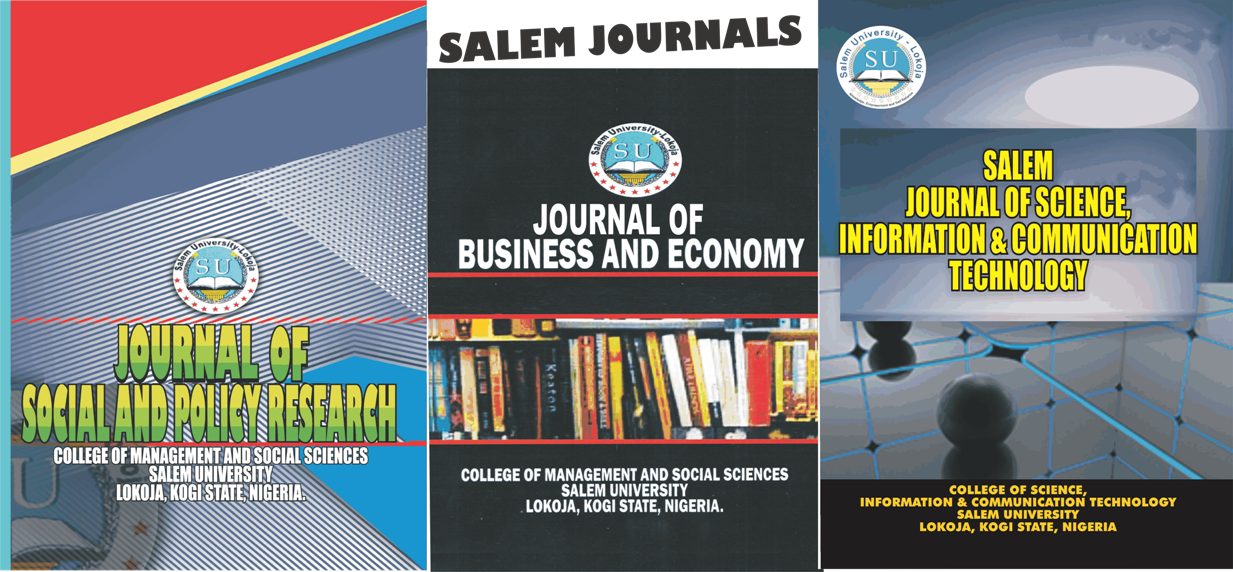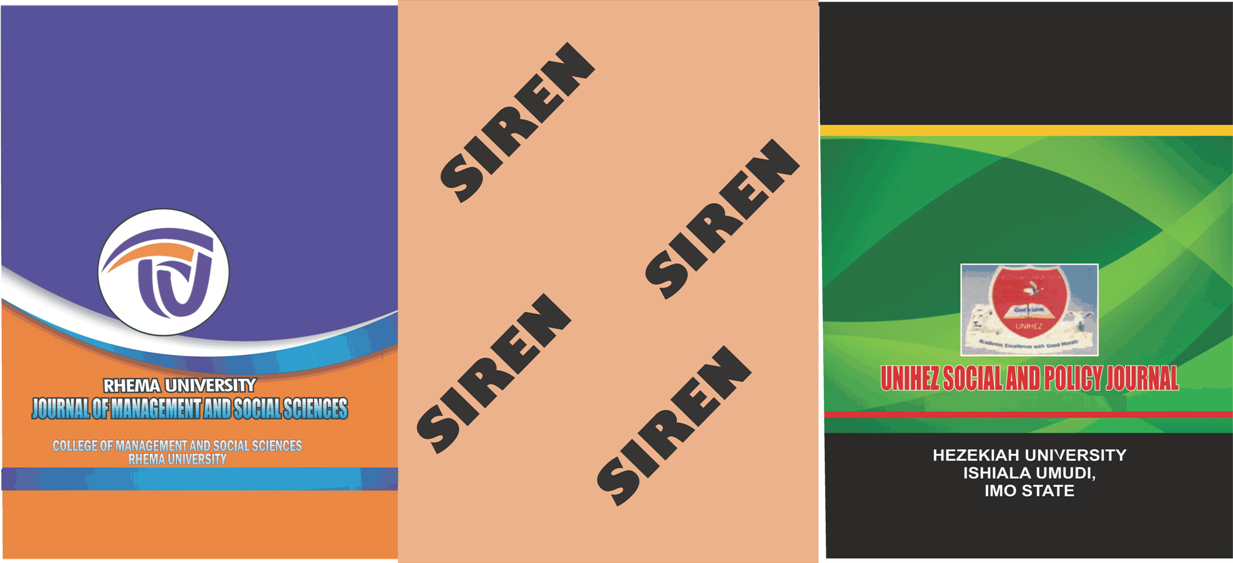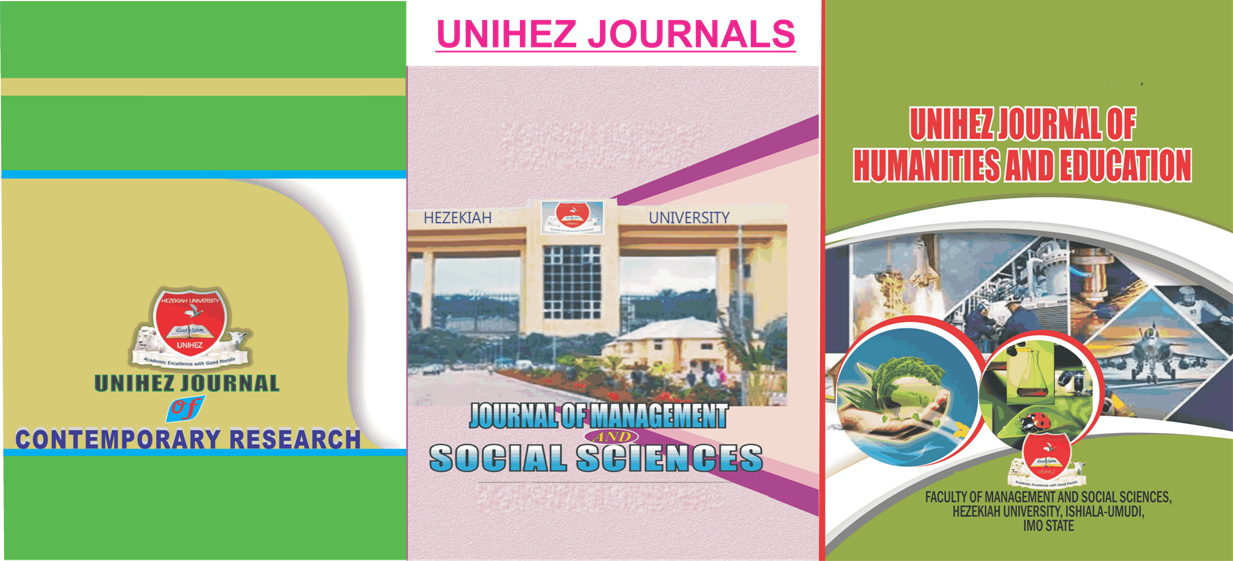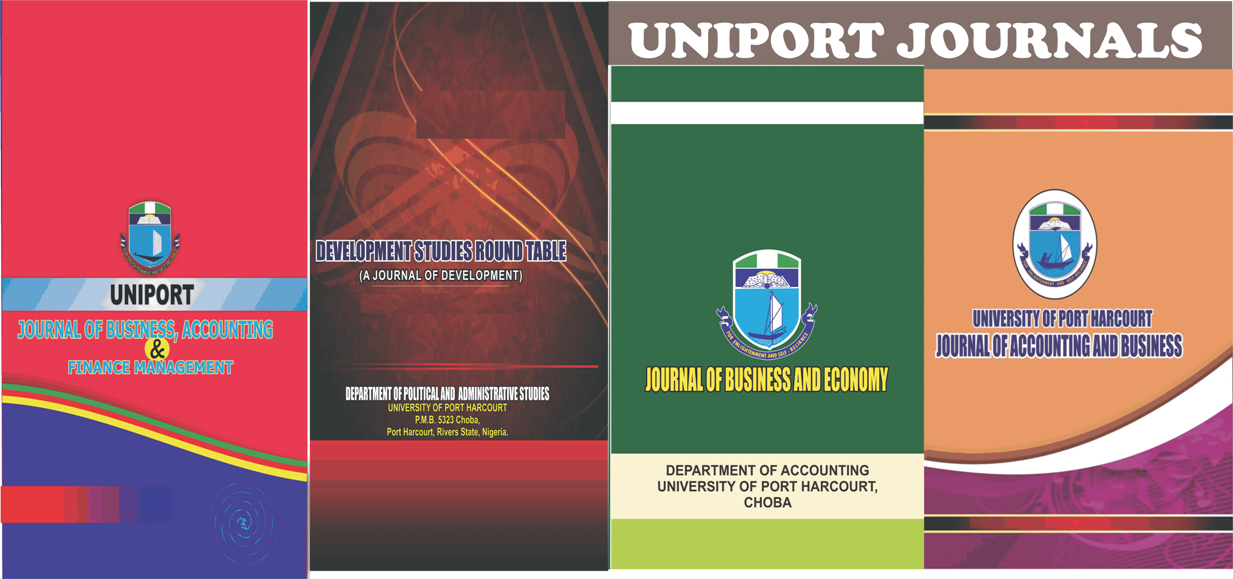2019 Archive
| 1 |
Title: YOUTHS IN NATIONAL LEADERSHIP THE WAY FORWARD.pdf Author: JOSEPHINE E. ELEKWA, PhD. AND ANELE, JUSTICE IRECHUKWU Abstract: Abstract This paper discusses the role of the youths in national leadership; the way forward. The paper was premised on the fact that youths’ inclusion in national leadership is imperative as no nation can prosper without its youths making contributions in government. It also aims at adding to the ongoing discourse on youth participation to issues of national concern and to supplement existing information available about the values and aspirations of young people towards participation in national leadership. This paper concludes by making recommendations that every national leadership plan must involve the youths at all levels of planning and implementation. It also made recommendations on the need to institutionalize youths participation in national leadership. Keywords: Youths, National Leadership. View |
| 2 |
Title: MANAGING TERTIARY INSTITUTIONS IN RIVERS STATE IN A DEPRESSED ECONOMY CHALLENGES AND STRATEGIES.pdf Author: OKAI, N. OKAI, PhD. AND MICAH TIMOTHY EPBABARI Abstract: Abstract This paper is on managing tertiary institutions in a depressed economy, challenges and strategies. The paper focuses on the concept of public tertiary education, its management in a depressed economy for sustainable growth and development. It discusses team work, co-operation among members of the academia, institutional autonomy and the issues of internal democracy (committee system) as some indices (ingredients) of good management. The negative impacts of infrastructural decay in the nation’s tertiary institutions in the face of depressed economy were also highlighted. Other major challenges include but not limited to inadequate resources, low standard of students intake (inputs), social vices on campus such as cultism bribery, corruption, quasi institutional autonomy and the likes were pointed out. Globalization and other innovations that integrate world economic to appreciate through trade, exchange of idea and movement of resources globally, leading to knowledge without boarder (making the world a global village) were critically examined. Some strategies on appropriate leadership styles and diversification that centred on management efficiency in tertiary institutions to work to not to work were prominently discussed. The paper thus asserted that if the human capital is properly harnessed, the climate of any organization (tertiary institutions incisive) will turn around for better, whether in economy depression or normalcy for sustainable development. The paper concluded that managers/operators of tertiary institutions must have a rethink from their conventional way of sourcing for fund. There should be a paradigm shift as to build, assist, establish customers and the larger society. The following suggestions were made: Vice-chancellors or provosts as the chief executive should be given the free hand to use their discretion, imagination, innovation, creativity and sense of prudence to judiciously and flexibly manage tertiary institutions in synergy with committees for the desired results; tertiary institutions should be organized and structured in a way to improved the alternative sourcing and managing of resources (human, material, finance and time). Quality assurance unit be built into management team/committees for total quality management and self sustaining programme. Key Words: Tertiary Education, Management, Economic Depression, Funding, Diversification of fund, Bribery, Corruption and Globalization. View |
| 3 |
Title: COLONIALISM AND THE AFRICAN INDIGENOUS KNOWLEDGE SYSTEMS THE EXAMPLE OF THE OGONI IN THE FORMER EASTERN REGION OF NIGERIA.pdf Author: UEBARI SAMUEL N-UE, PhD. AND ODIKE, EBENEZER LEVI, PhD. Abstract: Abstract The work is an attempt to examine African Indigenous Knowledge Systems during the colonial era using the Ogoni of the former Eastern Region of Nigeria as an example. The paper, which adopts the multi – disciplinary approach, reveals that a great deal of correlation existed between the colonial ideology and the neglect, disappearance and total abandonment, in some cases, of the traditional knowledge of Africa in preference for the erroneously and purportedly superior Western science, values, and cultures. The work maintains that it was the inglorious encounter with the European colonial enterprise that systematically denigrated the African Knowledge Systems. This development underscores the widespread European culture which is still practice by Africans several years after the attainment of political independence instead of their indigenously devised technology which corresponds adequately with their ambient environment. The paper opined that African history must be reconstructed by Africans so as to promote the African customs that have been badly damaged and some made to go into extinction. Keywords: Colonialism, African Indigenous Knowledge Systems, Technology, Culture, Belief. View |
| 4 |
Title: EDUCATION AS AN AGENT OF SOCIAL CHANGE A RE–APPRAISAL.pdf Author: ELEKWA, JOSEPHINE EBERE, PhD. AND KWULUJE HENRIETTA N. Abstract: Abstract This paper is focused on education as an agent of social change. A reappraisal. It introduces to the reader the sociological study of the theoretical perspective to social change and processes of social changes. The origin of sociology as an academic discipline is the history of the social change in the 18th and 19th century. At this period the Western Europe was swept with ravaging social changes and social problems it was associated with revolutions born out of the era of enlightenment: firstly the French Revolution which started in the 1789. Education plays a very important role in molding the character of an individual. Social change refers to the alteration in the social order of the society. A re-arrangement, new patterns, new arrangement of doing things with the social system, society doing things in a new way. Social change come about as man desires to conquer the environment or society in which he lives and brings about a new innovations. As a result of rapid industrialization, growing urbanization and changes in human intellect society need to change in order to cope with the gradual changes. Education can initiate social change by bringing about changes in outlook and attitudes of people. Present education is totally mechanized. It develops the cramming power of students but curbs individual thinking. Education is the root cause of social change that takes place within the society. Education has been and is being played as an agent of social change and development and socialization of the younger generation. So as to reach the expectation of the society. Keyword: social change, development. Education system, knowledge. Reappraisal. View |
| 5 |
Title: INTEGRATING INFORMATION AND COMMUNICATION TECHNOLOGY IN ENTREPRENUERSHIP EDUCATION FOR SUSTAINABLE DEVELOPMENT IN UNIVERSITIES IN RIVERS STATE.pdf Author: OKAI , N. OKAI, PhD. AND WORDU, JOHN AMAOGE Abstract: Abstract The upswing of information and communication technology globally has changed the way we relate, share ideas and communicate with each other. The adaptation of ICT into educational system has enriched content delivery, changed the methodology of teaching and learning and has improved sharing of information and ideas. The use of ICT has provided the platform where people acquire certain skills in information technology which is a prelude to acquisition of skills that will make the individuals providers of jobs and self-sustaining. The paper examines extensively the concepts and nexus of information and communication technology, entrepreneur ship education and sustainable development. The paper looks at the various benefits associated with the integration of ICT for entrepreneur ship education for sustainable development namely, provider of job opportunities and multi spring income, expertise on the use of information technology, cyber cafe business and others which help to reduce the poverty level among the citizens, increase their saving and investment and finally improve the GDP. The paper1 concludes that ICT tools is the best platform for the achievement of entrepreneurship education, an inclusive education that will encourage sustainable development. The paper suggest among others that government at all levels should make concerted efforts to provide adequate fund for educational institutions and human capacity building should be upper most if the state must participate in 21stcentury information driven age, the educational curriculum should be redesigned to integrate computer education. Keywords. Information and Communication Technology, Entrepreneur ship, Entrepreneur ship Education, Development and Sustainable Development. View |
| 6 |
Title: CARTESIAN MYSTERY O DUALISM THE KEY TO EPISTEMIC ESSENCE.pdf Author: DOMINIC ZUOKE KALU, PhD. Abstract: This research work was anchored on the Cartesian dualism. Descartes convincingly asserts that mind and body are two distinct entities and that the mind has the propensity to exist independently without the body. This view point of Descartes generates lots of questions and attracts criticism from different angles. A cognitive mind may ask; how can the two (corporeal and incorporeal) interact effectively since they are completely different from each other, having different nature? Can the mind cause effect (event) on the body? This research applied the methodology of comparative analysis, in other to conspicuously explore, identify and to make visible the point of interface to all and sundry. This work finds out that Descartes committed epistemic jump. He only identified the link that connect the two concepts at the spinal gland, located at the back bone that linked to the brain, but he hastily leaps to conclusion without stating categorically, the mode of discussion and understanding. Key words: Cartesian, Dualism, Epistemic and Essence, Mystery. View |
| 7 |
Title: OGONI MINORITY ACTIVISM A METAPHOR FOR MINORITIES’ AGITATIONS IN THE 2OTH CENTURY NIGERIA 1990–2015.pdf Author: UEBARI SAMUEL N-UE, PhD. AND GOODNEWS WABAH, PhD. Abstract: Abstract This paper is an attempt at examining the Ogoni minority activism under the vanguard of the Movement for the Survival of the Ogoni People (MOSOP) as a metaphor for ethnic minorities’ agitations in the 20th century Nigerian State. Using the multi – disciplinary approach and diverse historical secondary sources, the work provides that the Ogoni people under the aegis of MOSOP evidently became the epitome of minorities’ consciousness in modern Nigeria as they championed the non – violent struggle for resource control, self – determination, environmental justice and political autonomy within the frame work of the Nigerian federation. The study demonstrates that MOSOP frontally confronted their alleged tormentors – the hegemonic power – blocs and the mindless oil operations in Nigeria to liberate its land from what the Ogoni perceived as brazen ethnic oppression, suppression and marginalization. Starkly put, MOSOP out – rightly demanded the restructuring of the political iniquitous imbalances in the Nigerian system, a fair and equitable distribution of the economic prosperity of the nation and the just treatment of the ethnic minorities’ of Nigeria from whose land the bulk of the oil wealth that sustains the Nigerian economy is derived. The Nigerian state has often ignored its minorities’ legitimate demand on account of their small size of population, but instead of being fair to them, the country’s ruling power is known to utilizing bloody and brutal repressive and suppressive mechanisms. The work notes that the Ogoni struggle is not a parochial, self – recognized and an exclusive organization. Rather, it is a metaphoric representation of the plights of all the down trodden and neglected ethnic minority groups in Nigeria whose voices have hardly been hard but which deserve to be heard and treated fairly and justly. The study recommends, among other measures, the practice of “true federalism”, arguing that it is only then that we can proudly say that “true federalism” exist in the Nigeria – state. Keywords: MOSOP, Minorities, Agitation, Resource Control, Marginalizati View |
| 8 |
Title: ANALYSIS OF IMPACT OF WOMEN EDUCATION AND EMPOWERMENT ON SUSTAINABLE DEVELOPMENT IN SELECTED ECOWAS COUNTRIES.pdf Author: BOSEDE AKANBI, PhD. AND TEMITOPE AKINTUNDE, PhD. Abstract: Abstract It has become clear among the policy makers and international agencies that women constitute bulk of their population and are indispensable on the issues of sustainable development. The fact that women constitute half of the entire population makes empowering them to be an active part of all sustainable development initiatives in all countries. However, the extent to which women’s education and empowerment have influenced sustainable development in West African economies seems to be unclear, hence the objective of this study is to examine the impact of women’s education and empowerment on sustainable development of west African economies. This paper utilized data that were sourced mainly from World Development Indicators and World Bank National data. This paper utilized Pedroni Cointegration and Pooled Ordinary Least Square technique (POOLED OLS) to examine the long run and causal relationship between women education, empowerment and sustainable development in selected ECOWAS economies. The paper concluded that unless women are empowered and gender equality achieved so that women can play their role in economic, social, political, and environmental areas, the country will not achieve sustainable development. Keywords: women empowerment, women education, sustainable development View |
| 9 |
Title: HORIZONTAL OCCUPATIONAL MOBILITY AND THE DEVELOPMENT OF UNIVERSITIES A STUDY OF UNIVERSITY ADMINISTRATORS IN SOUTHERN NIGERIA.pdf Author: MMECHA, HELEN OZIRI, JOAB-PETERSIDE, SOFIRI AND OKODUDU, STEVE A. Abstract: Abstract Many university administrators change their occupations of origin to teaching after acquiring relevant additional skill, knowledge and experience in their administrative jobs. This study examined the impact of horizontal occupational mobility among university administrators on the development of universities in Southern Nigeria, with respect to how it influences professionalism, effective inter-cadre interface and effective policy implementation in the Registry section of universities. Three objectives and research questions guided the study. The theoretical framework comprised the Work Adjustment and General Systems Theories. The research type is ex-post facto and the cross-sectional survey research design was adopted to study a cross-section of the population of 5,645 university employees. Six sample States were selected through cluster and systematic sampling techniques while the sample universities and respondents were selected through the stratified and purposive sampling techniques. The sample size of 343 respondents was determined through the data saturation method. In-depth Interview and Focus Group Discussion instruments were utilized to gather in-depth data based on the respondents’ experiences in addition to official reports. The QSR NVivo software was adopted for the deductive thematic analysis of the data. It was found that horizontal occupational mobility among university administrators reduces the level of professionalism, has an insignificant positive influence on effective inter-cadre interface and reduces the level of effective policy implementation in the Registry section of universities. This study concluded that horizontal occupational mobility among university administrators has a detrimental impact on the development of universities in Southern Nigeria. It is recommended that processes of horizontal occupational mobility should be structured in line with institutionalized policies and attention given to skill vacuum, staff replacement and re-training. Key Words: Horizontal Occupational Mobility, Development of Universities, Professionalism, Effective Inter-cadre Interface, Effective Policy Implementation. View |
